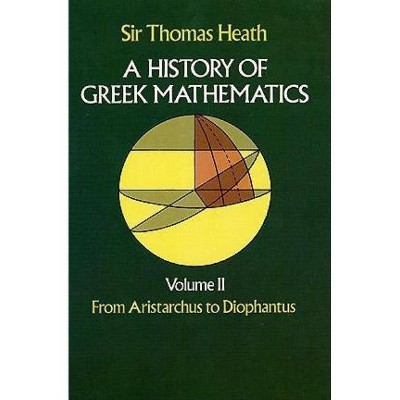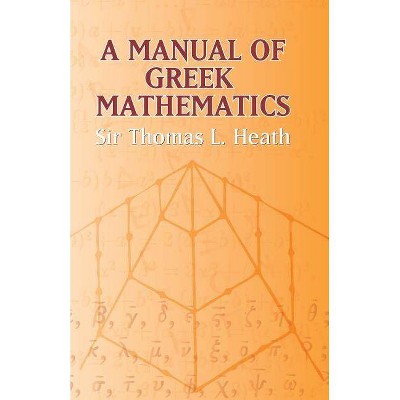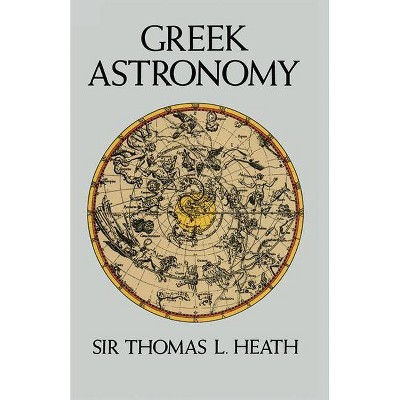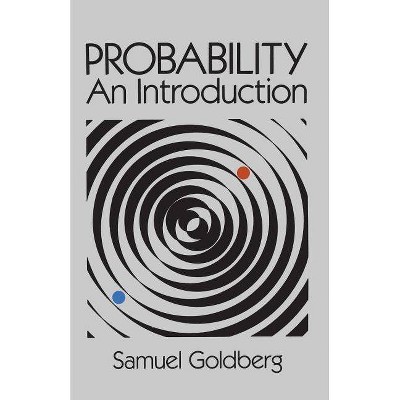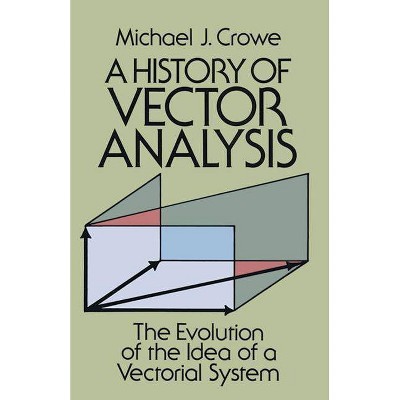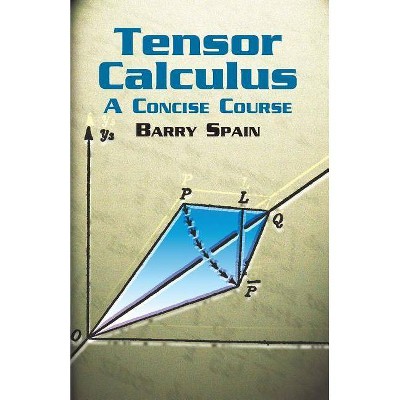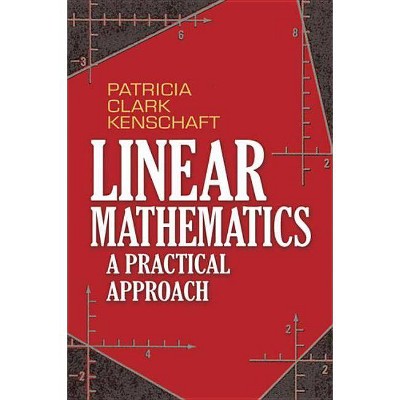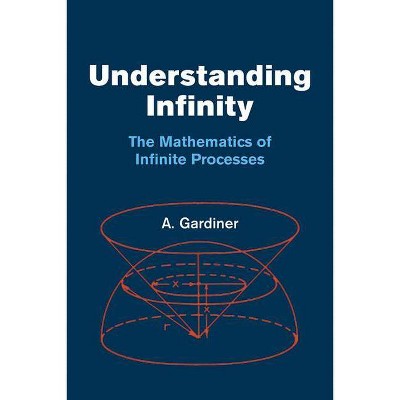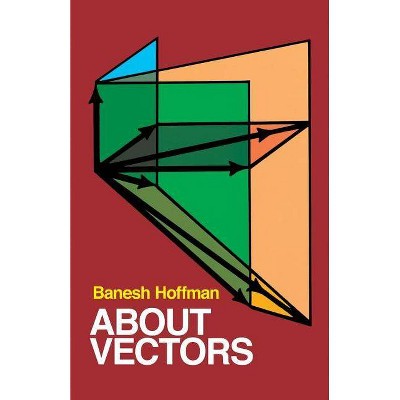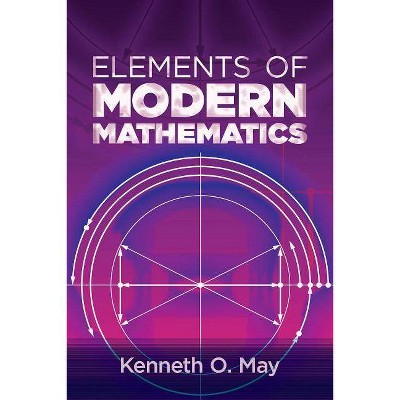A History of Greek Mathematics, Volume I - (Dover Books on Mathematics) by Sir Thomas Heath (Paperback)
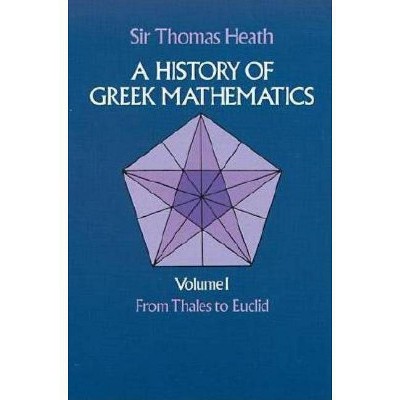
Similar Products
Products of same category from the store
AllProduct info
<p/><br></br><p><b> About the Book </b></p></br></br>Volume 1 of an authoritative two-volume set that covers the essentials of mathematics and features every landmark innovation and every important figure, including Euclid, Apollonius, Archimedes, and others.<p/><br></br><p><b> Book Synopsis </b></p></br></br><p>"As it is, the book is indispensable; it has, indeed, no serious English rival." -- <i>Times Literary Supplement</i>. <br>"Sir Thomas Heath, foremost English historian of the ancient exact sciences in the twentieth century." -- Professor W. H. Stahl<br>"Indeed, seeing that so much of Greek is mathematics, it is arguable that, if one would understand the Greek genius fully, it would be a good plan to begin with their geometry." <br>The perspective that enabled Sir Thomas Heath to understand the Greek genius -- deep intimacy with languages, literatures, philosophy, and all the sciences -- brought him perhaps closer to his beloved subjects and to their own ideal of educated men, than is common or even possible today. Heath read the original texts with a critical, scrupulous eye, and brought to this definitive two-volume history the insights of a mathematician communicated with the clarity of classically taught English. <br>"Of all the manifestations of the Greek genius none is more impressive and even awe-inspiring than that which is revealed by the history of Greek mathematics." Heath records that history with the scholarly comprehension and comprehensiveness that marks this work as obviously classic now as when it first appeared in 1921. The linkage and unity of mathematics and philosophy suggest the outline for the entire history. Heath covers in sequence Greek numerical notation, Pythagorean arithmetic, Thales and Pythagorean geometry, Zeno, Plato, Euclid, Aristarchus, Archimedes, Apollonius, Hipparchus and trigonometry, Ptolemy, Heron, Pappus, Diophantus of Alexandria and the algebra. Interspersed are sections devoted to the history and analysis of famous problems: squaring the circle, angle trisection, duplication of the cube, and an appendix on Archimedes' proof of the subtangent property of a spiral. The coverage is everywhere thorough and judicious; but Heath is not content with plain exposition: <br>It is a defect in the existing histories that, while they state generally the contents of, and the main propositions proved in, the great treatises of Archimedes and Apollonius, they make little attempt to describe the procedure by which the results are obtained. I have therefore taken pains, in the most significant cases, to show the course of the argument in sufficient detail to enable a competent mathematician to grasp the method used and to apply it, if he will, to other similar investigations. <br>Mathematicians, then, will rejoice to find Heath back in print and accessible after many years. Historians of Greek culture and science can renew acquaintance with a standard reference; readers in general will find, particularly in the energetic discourses on Euclid and Archimedes, exactly what Heath means by <i>impressive and awe-inspiring</i>. </p><p/><br></br><p><b> From the Back Cover </b></p></br></br><p>"As it is, the book is indispensable; it has, indeed, no serious English rival."--<i>Times Literary Supplement</i>. <br>"Sir Thomas Heath, foremost English historian of the ancient exact sciences in the twentieth century."--Professor W. H. Stahl<br>"Indeed, seeing that so much of Greek is mathematics, it is arguable that, if one would understand the Greek genius fully, it would be a good plan to begin with their geometry." <br>The perspective that enabled Sir Thomas Heath to understand the Greek genius--deep intimacy with languages, literatures, philosophy, and all the sciences--brought him perhaps closer to his beloved subjects and to their own ideal of educated men, than is common or even possible today. Heath read the original texts with a critical, scrupulous eye, and brought to this definitive two-volume history the insights of a mathematician communicated with the clarity of classically taught English. <br>"Of all the manifestations of the Greek genius none is more impressive and even awe-inspiring than that which is revealed by the history of Greek mathematics." Heath records that history with the scholarly comprehension and comprehensiveness that marks this work as obviously classic now as when it first appeared in 1921. The linkage and unity of mathematics and philosophy suggest the outline for the entire history. Heath covers in sequence Greek numerical notation, Pythagorean arithmetic, Thales and Pythagorean geometry, Zeno, Plato, Euclid, Aristarchus, Archimedes, Apollonius, Hipparchus and trigonometry, Ptolemy, Heron, Pappus, Diophantus of Alexandria and the algebra. Interspersed are sections devoted to the history and analysis of famous problems: squaring the circle, angle trisection, duplication of the cube, and an appendix on Archimedes' proof of the subtangent property of a spiral. The coverage is everywhere thorough and judicious; but Heath is not content with plain exposition: <br>It is a defect in the existing histories that, while they state generally the contents of, and the main propositions proved in, the great treatises of Archimedes and Apollonius, they make little attempt to describe the procedure by which the results are obtained. I have therefore taken pains, in the most significant cases, to show the course of the argument in sufficient detail to enable a competent mathematician to grasp the method used and to apply it, if he will, to other similar investigations. <br>Mathematicians, then, will rejoice to find Heath back in print and accessible after many years. Historians of Greek culture and science can renew acquaintance with a standard reference; readers in general will find, particularly in the energetic discourses on Euclid and Archimedes, exactly what Heath means by <i>impressive and awe-inspiring</i>. <br>Unabridged (1981) republication of the original 1921 edition published by Oxford University Press. </p><p/><br></br><p><b> About the Author </b></p></br></br><p><b>Thomas Little Heath: Bringing the Past to Life <br></b>Thomas Little Heath (1861-1940) was unusual for an authority on many esoteric, and many less esoteric, subjects in the history of mathematics in that he was never a university professor. The son of an English farmer from Lincolnshire, Heath demonstrated his academic gifts at a young age; studied at Trinity College, Cambridge, from 1879 to 1882; came away with numerous awards; and obtained the top grade in the 1884 English Civil Service examination. From that foundation, he went to work in the English Treasury, rose through the ranks, and by 1913, was permanent secretary to the Treasury, effectively the head of its operations. He left that post in 1919 at the end of the first World War, worked several years at the National Debt office, and retired in 1926. <br>During all of that time, however, he became independently one of the world's leading authorities on the history of mathematics, especially on the history of ancient Greek mathematics. Heath's three-volume edition of <i>Euclid</i> is still the standard, it is generally accepted that it is primarily through Heath's great work on Archimedes that the accomplishments of Archimedes are known as well as they are. <br>Dover has reprinted these and other books by Heath, preserving over several decades a unique legacy in the history of mathematical scholarship. <p><b><p>In the Author's Own Words: <br></b>"The works of Archimedes are without exception, monuments of mathematical exposition; the gradual revelation of the plan of attack, the masterly ordering of the propositions, the stern elimination of everything not immediately relevant to the purpose, the finish of the whole, are so impressive in their perfection as to create a feeling akin to awe in the mind of the reader." -- Thomas L. Heath </p></p></p>
Price History
Cheapest price in the interval: 20.49 on November 8, 2021
Most expensive price in the interval: 21.49 on March 10, 2021
Price Archive shows prices from various stores, lets you see history and find the cheapest. There is no actual sale on the website. For all support, inquiry and suggestion messagescommunication@pricearchive.us
